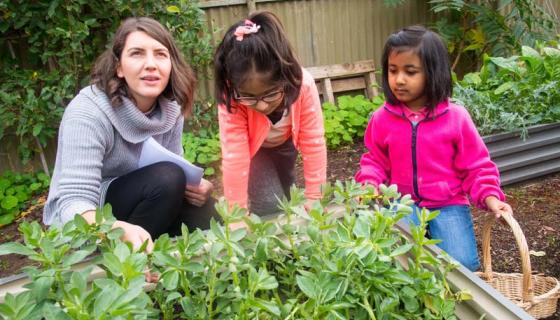
Outdoor play is integral to the Approved Learning Frameworks
Outdoor play is an integral part of the Approved Learning Frameworks and the National Quality Standard.
Playing outside provides children with valuable education and development opportunities, including:
- physical activity
- creativity
- discovery
- learning through play
- health and wellbeing
- social skills
- independence
- exploration
- appreciation of nature
- relaxing and having fun.
While the Education Standards Board doesn’t prescribe what outdoor play for children looks like, authorised officer Janet shares some ideas on the value of outdoor play and how it may be done.
“Some educators explain how they take a Reggio Emilia approach and view the environment as the third teacher,” she said. “You don’t necessarily need to bring additional equipment and resources into the natural environment.”
Environments with rich potential for learning and play could have rustling leaves, grasses, insect hotels, bird gardens, vegetable gardens, tree stumps, logs, creeks, plants and trees.They might include sand, mud, water, rocks, pebbles and textural elements (considering the ages of the children), things to touch and smell. Tactile, natural and other materials promote open-ended exploratory play and learning. Loose-parts play can be valuable for children’s learning. Piping, tree stumps, logs, palettes and crates. Recycled and repurposed items that are loose—that children can move wherever they want—can be used in multiple ways.
Children’s learning is promoted through some unstructured, open-ended play, and being outdoors encourages that. Children should be encouraged to follow their own interests: use their imagination, explore, be curious, experiment, while being outside supports an appreciation for nature and living things.
How can services maximise fun and learning but minimise risk?
Risk-assessments and risk-minimisation plans are mandatory for outdoor play and outdoor environments. Children must be adequately supervised while playing outdoors and educators should be aware of how children will interact with the environment.
For more information, please see the Outdoor play areas in education and care services policy or the resources listed below.
Gardening
Sport and games
Loose-parts play, construction, transporting, gathering and collection
Noticing: texture, food, habitat for insects, birds or butterflies
Climbing, running, rolling, sliding, balancing and jumping
Resting and socialising in small groups
Imagining and role play
Further reading
Babies and outdoor play: ACECQA fact sheet
Nature play SA Natural playspaces principles
Kidsafe NSW: Challenging play: risky!
Professional development
Attend a session with OSHCsa on loose-parts play
Natural incursions and excursions
Incursions and excursions by Nature Play SA
Mobile junk and nature playground

